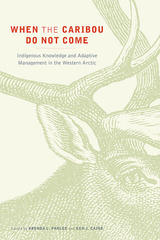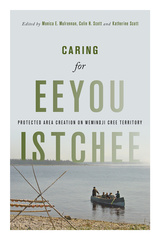
Indigenous Empowerment through Co-management
Land Claims Boards, Wildlife Management, and Environmental Regulation
Co-management boards, established under comprehensive land claims agreements with Indigenous peoples, have become key players in land-use planning, wildlife management, and environmental regulation across Canada’s North. This book provides a detailed account of the operation and effectiveness of these new forms of federalism in order to address a central question: Have co-management boards been successful in ensuring substantial Indigenous involvement in policies affecting the land and wildlife in their traditional territories?
Graham White tackles this question, drawing on decades of research and writing about the politics of Northern Canada. He begins with an overview of the boards, examining their legal foundations, structure and membership, decision-making processes, and independence from government. He then presents case studies of several important boards. His analysis focuses on two issues: the extent of involvement of Indigenous communities and governments in board processes, and board efforts to incorporate Indigenous knowledge into its decisions and operations.
While White identifies constraints on the role Northern Indigenous peoples play in board processes, he finds that overall they do exercise extensive decision-making influence. His findings are provocative and offer valuable insights into our understanding of the importance of land claims boards and the role they play in the evolution of treaty federalism in Canada.
This book is essential reading for scholars and students of relations between Indigenous peoples and the state, co-management systems for natural resources, and Northern government and politics; members of Northern governments and boards will also be interested in the findings presented here, as will members of Indigenous governments and organizations more broadly.
His lucid treatment of critics and the continuing evolution of the boards up to the present is revelatory. This work is seminal for Canadians and instructive for states attempting to implement similar policies, an important contribution to the literature.
One of the best works of political science ever produced on the Canadian North.
In this important book, Graham White deftly weaves together meticulous research and his own experience to tell a compelling story about the emergence of land claims boards and the growing pains of their first twenty years. The result is a rich analysis of one of the central institutions of comprehensive land claims agreements and their role in the evolution of treaty federalism in Canada.
Preface
Part 1: What Are Land Claims–Based Co-management Boards?
1 A New Species in the Canadian Governmental Menagerie
2 Northern Governments, Land Claims, and Land Claims Boards
Part 2: Specific Land Claims Boards
3 The Nunavut Wildlife Management Board
4 The Yukon Fish and Wildlife Management Board
5 The Mackenzie Valley Environmental Impact Review Board and the Mackenzie Valley Land and Water Board
6 The Mackenzie Valley Boards and the Regulatory Improvement Saga
Part 3: A Review of the Key Issues
7 Issues of Board Independence
8 Traditional Knowledge in Claims-Mandated Co-management Board
9 Indigenous Influence through Claims Boards?
Notes; Selected Bibliography; Index










